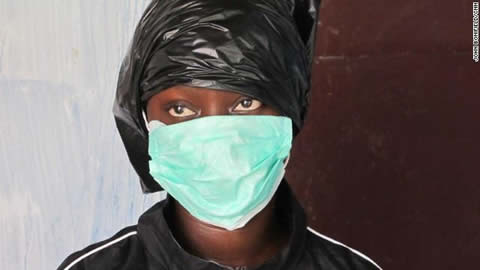It can be exhausting nursing a child through a nasty bout with the flu, so imagine how 22-year-old Fatu Kekula felt nursing her entire family through Ebola.
Her father. Her mother. Her sister. Her cousin. Fatu took care of them all, single-handedly feeding them, cleaning them and giving them medications.
And she did so with remarkable success. Three out of her four patients survived. That’s a 25% death rate — considerably better than the estimated Ebola death rate of 70%.
Fatu stayed healthy, which is noteworthy considering that more than 300 health care workers have become infected with Ebola, and she didn’t even have personal protection equipment — those white space suits and goggles used in Ebola treatment units.
Instead Fatu, who’s in her final year of nursing school, invented her own equipment. International aid workers heard about Fatu’s “trash bag method” and are now teaching it to other West Africans who can’t get into hospitals and don’t have protective gear of their own.
Every day, several times a day for about two weeks, Fatu put trash bags over her socks and tied them in a knot over her calves. Then she put on a pair of rubber boots and then another set of trash bags over the boots.
She wrapped her hair in a pair of stockings and over that a trash bag. Next she donned a raincoat and four pairs of gloves on each hand, followed by a mask.
It was an arduous and time-consuming process, but Fatu was religious about it, never cutting corners.
UNICEF Spokeswoman Sarah Crowe said Fatu is amazing.
“Essentially this is a tale of how communities are doing things for themselves,” Crowe said. “Our approach is to listen and work with communities and help them do the best they can with what they have.”
Two doctors for 85,000 people
She emphasized, of course, that it would be better for patients to be in real hospitals with doctors and nurses in protective gear — it’s just that those things aren’t available to many West Africans.
No one knows that better than Fatu.
Her Ebola nightmare started Juy 27, when her father, Moses, had a spike in blood pressure. She took him to a hospital in their home city of Kakata.
A bed was free because a patient had just passed away. What no one realized at the time was that the patient had died of Ebola.
One woman walked in, and the Ebola nightmare began
Moses, 52, developed a fever, vomiting and diarrhea. Then the hospital closed down because nurses started dying of Ebola.
Fatu took her father to Monrovia, the capital city, about a 90-minute drive via difficult roads. Three hospitals turned him away because they were full.
She took him back to another hospital in Kakata. They said he had typhoid fever and did little for him, so Fatu took him home, where he infected three other family members: Fatu’s mother, Victoria, 57; Fatu’s sister, Vivian, 28, and their 14-year-old cousin who was living with them, Alfred Winnie.
Guilty of Ebola until proven otherwise
While operating her one-woman Ebola hospital for two weeks, Fatu consulted with their family doctor, who would talk to her on the phone, but wouldn’t come to the house. She gave them medicines she obtained from the local clinic and fluids through intravenous lines that she started.
At times, her patients’ blood pressure plummeted so low she feared they would die.
“I cried many times,” she said. “I said ‘God, you want to tell me I’m going to lose my entire family?’ ”
But her father, mother, and sister rallied and were well on their way to recovery when space became available at JFK Medical Center on August 17. Alfred never recovered, though, and passed away at the hospital the next day.
“I’m very, very proud,” her father said. “She saved my life through the almighty God.”
Now he’s working to find a scholarship for Fatu so she can finish her final year of nursing school. He has no doubt his daughter will go on to save many more people during her life.
“I’m sure she’ll be a great giant of Liberia,” he said.
Source: CNN


